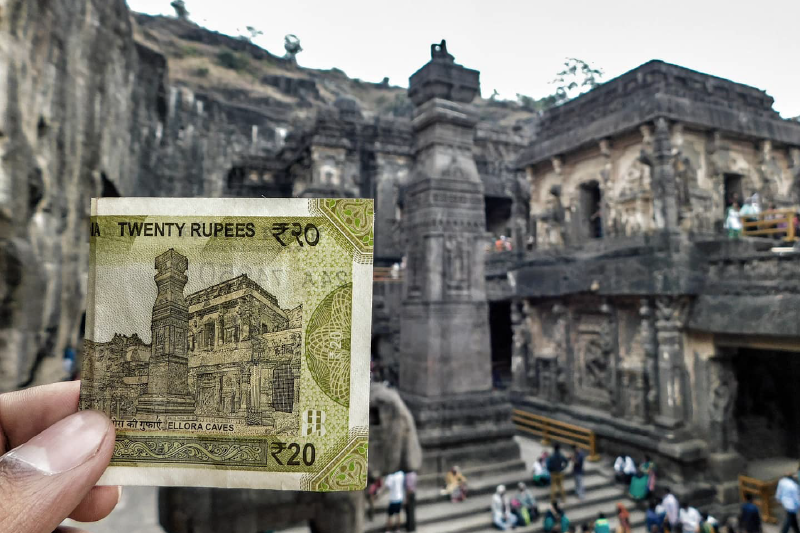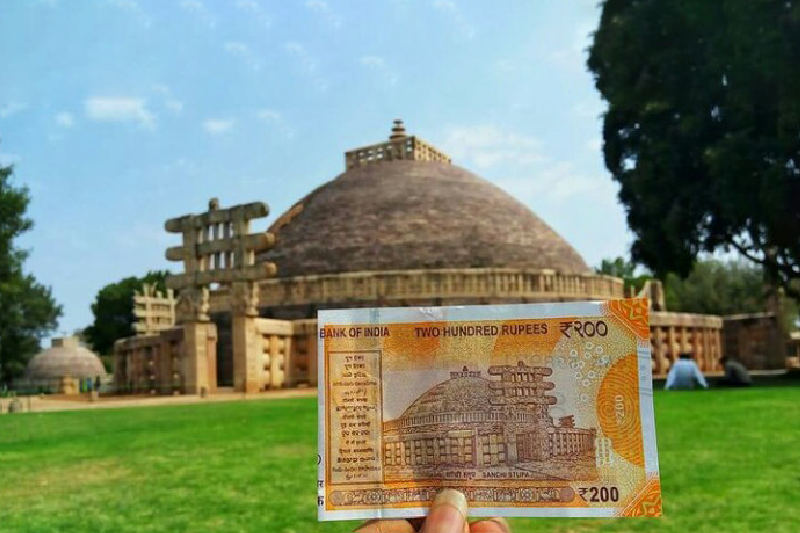When you are new to the world of traveling, oftentimes it may happen that you can’t wait to weave interesting travel memories, but at the same time, may not be sure where to start this amazing journey. If you are in a beginner’s dilemma or simply seeking some travel inspiration for your next trip, then let us remind you that the Indian currency has it in plenty.
The set of banknotes released by the Reserve Bank of India under the Mahatma Gandhi New Series (post-demonetization) came in renewed sizes and fluorescent colors, wearing India’s rich heritage on the reverse side. Except for the brand-new 2000 note which was emblazoned with the image of Mangalyaan (India’s first interplanetary mission), all the other notes featured India’s iconic heritage sites. Let’s decode the significance of each of these monuments that made it to the Indian Currency Notes in circulation (and also to the list of UNESCO World Heritage Sites).
₹10 – Konark Sun Temple

Considered an artistic, architectural, and engineering marvel; the Konark Sun Temple forms a part of the Golden Triangle of Odisha. This ancient temple constructed in the Kalinga style of architecture was designed like the mythical chariot of Surya Deva (the Sun God). Beautiful carvings and sculptures of dancers and musicians adorn the stone walls, and what’s even more impressive about Konark Sun Temple is the time symbolism behind its architectural features.
The 12 pairs of stone-carved wheels and 7 horses represent the 12 months of the Hindu calendar and 7 days of the week respectively. These wheels, each with 8 main spokes, act as a sundial; one can tell time by looking at the position of the shadow cast by the spokes. Nobel laureate Rabindranath Tagore, in awe of Konark’s brilliance, said, “Here the language of stone surpasses the language of man”, and we couldn’t agree more.
₹20 – Ellora Caves

Belonging to the period between the 5th and 11th centuries, Ellora caves are some of the finest examples of rock-cut architecture of ancient India. A group of more than 100 caves sculpted out of the basalt cliffs of the Charanandari Hills in Maharashtra, only 34 of them (17 Hindu, 12 Buddhist, and 5 Jain caves) are accessible to tourists. The stunning rock-cut temples, their elaborate sculptures, and paintings with religious imagery draw a great number of tourists from all over the world.
The most remarkable of them all is the Kailasa Temple (Cave 16). It’s the largest monolithic structure in the world, and what’s even more astonishing is the fact that it was carved top-down! Other than this, the Visvakarma cave with one of the biggest Buddha statues, and the Dashavatara cave depicting the ten avatars of Lord Vishnu are Ellora’s two more prominent sculptures.
₹50 – Hampi

A mystical town steeped in history, Hampi is a treasure trove of ancient temples, forts, palaces, and many other monuments. The Stone Chariot of Hampi, which lies within the Vittala Temple Complex, is among India’s three iconic stone chariots. Built in the traditional Dravidian style, this shrine is dedicated to Garuda (Lord Vishnu’s vahana). The carvings on its walls are mind-bogglingly intricate, making one wonder at the incredible craftsmanship of artists who created it some hundreds of years ago.
Hampi enjoyed its golden phase as the capital of the Vijayanagara empire, during which the city flourished remarkably in all spheres. It was, in fact, the world’s second-largest medieval-era city and one of the richest in India. Muslim Sultanates and their invasions left this once-prosperous city in shambles. Although in ruins today, Hampi never really ceased to fascinate history buffs. The remnants of its past glory together with its boulder-strewn landscape inspire travelers to return to Hampi.
Also Read: Temples of Hampi
₹100 – Rani Ki Vav

A millennium-old stepwell, Rani Ki Vav is not merely a water storage and management system! It is an architectural wonder; an exceptional example of the stepwell architecture in Gujarat. Designed like an inverted temple (in reverence to water – the source of life), this 11th-century stepwell is a seven-storied structure, embellished with over 1500 ornate sculptures of Gods, Goddesses, and, other mythological figures. It is almost 65 meters long, 20 meters wide, and 28 meters deep. A flight of stairs laid out in distinct geometric patterns leads one through this gorgeous stepwell.
The construction of Rani Ki Vav was commissioned by Queen Udayamati in memory of her husband. It was rather an offbeat attraction in Gujarat until UNESCO declared it a World Heritage Site in 2014, thus bringing this place into the limelight that it rightly deserved. Later in July 2018, the Reserve Bank of India unveiled its new Rs.100 note with the Rani Ki Vav motif.
₹200 – Sanchi Stupa

RBI’s never-seen-before banknote with ₹200 denomination was introduced on 24 August 2017 and had the Great Sanchi Stupa printed on its backside. This Buddhist monument in Sanchi is well-known for its 54-ft tall hemispherical dome-shaped structure and four ornamental toranas (gateways) whose fine inscriptions depicted Jataka tales and Buddhist teachings. The central chamber stashes the relics of Lord Buddha.
Built by the Mauryan King Ashoka in the 3rd century B.C., the site was further developed as a Buddhist complex during the Shunga period and the new elements that were later added to it included a staircase, several smaller stupas, a railing around the main stupa and three chhatris (umbrella-like structures) on the top of the dome that stand for Triratna, the three jewels of Buddhism. Sanchi Stupa is the oldest stone structure in India and one of the world’s most important Buddhist pilgrim sites
₹500 – Red Fort

Issued within a few days of the demonetization announcement in November 2016, RBI’s new ₹500 banknotes contained the motif of Lal Qila or the Red Fort. Originally called the Qila-i-Mubarak, meaning the Blessed Fort, the Lal Qila is a beautiful monument of great historical importance. It is popularly called the Red Fort, referring to the red sandstone with which its imposing walls are made.
The Lal Quila complex with its beautiful gardens and stunning halls and palaces is considered to “represent the zenith of Mughal creativity under Shah Jahan.” Designed by Ustad Ahmad Lahori, the same architect who created the Taj Mahal, Red Fort’s design reflects elements from Mughal, Persian, Hindu, and Timurid styles of architecture. Agra Fort served as the architectural inspiration for this mammoth fort. The spectacular light and sound show that happens here every evening narrates the landmark events in the fort’s (and the country’s) history, and it should not be missed when you visit this fort during your Delhi tour.
Frequently Answered Questions
What are the monuments on Indian currency notes?
Heritage sites such as the Sun Temple in Konark (₹10), Ellora Caves (₹20), Hampi (₹50), Rani Ki Vav in Patan (₹100), Red Fort in Delhi (₹500), and Mangalyaan on the ₹2000 note are all featured on Indian currency notes.
Which monument is on the ₹200 note?
The ₹200 note features the Sanchi Stupa, an ancient Buddhist monument in Madhya Pradesh known for its historical significance and intricate carvings.
Which monument is on the ₹2000 note?
The ₹2000 note features the Mangalyaan, India’s Mars Orbiter Mission, symbolizing the country’s achievements in space exploration.
